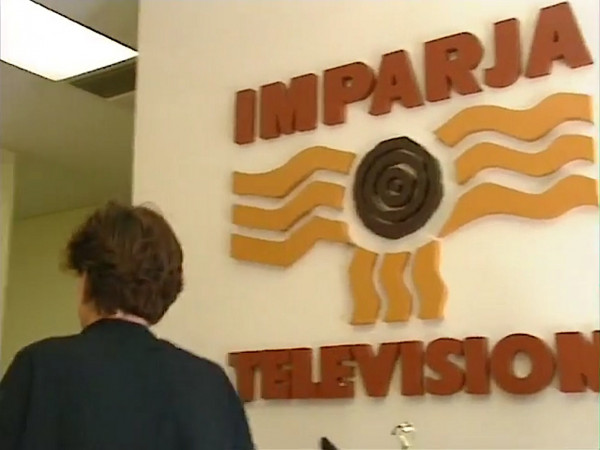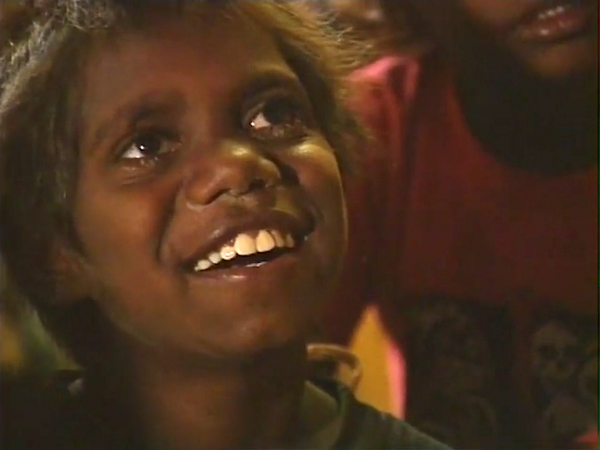
6. Nganampa Anwernekenhe
[Clip from Nganampa Anwernekenhe]
Language Co-ordinator, CAAMA
Well Nganampa Anwernekenhe is a very unique programme. Some of the things that we collect the material from, like dreamtime or something, you don’t see it on other programmes – even on white television, like you’ll have Bush Tucker Man, right. But he’s nowhere near where we can find bush tucker. You think he’s got… the experience to go on with bush tucker, but he still needs Aboriginal people to teach him, to show him, how to find them… He never know what he could be eating. Do you know, programmes like Blackout, they just write straight, because they’ve been produced by English speaking Aboriginal people. With us, we’ve got two cultures and we’re trying to combine them, trying to please the white audience as well as the Aboriginal… keeping the Aboriginal way still strong within it.
Station Manager, Imaparja TV
It is the only Aboriginal…programme in Australia, which is made in Aboriginal language. None of the other… RCTS stations [Remote Commercial Television Services] which also have a responsibility to provide services to Aboriginal people specifically, they all use the cheap magazine style: interviews, you go out there…you shoot… provide a voice-over, it’s usually a spokesperson on behalf of the community, and it’s a magazine – very cheap, simple type of programming. And in fact, the ABC and SBS have done programming in that form. Nganampa is the only programme in which a language speaker leads a team – a lot of them Aboriginal people in their own right – going out into the bush. They go to a community, they meld with that community: if somebody doesn’t want to speak to them that morning or that day, then they have to tolerate that, which makes that programme extremely expensive, and very difficult to make.
Nganampa Editor
You might go out on a Nganampa shoot that’s been pre-planned about 3 weeks before that, and you front up and you find out that someone’s passed away. So you have to leave the community, can’t go out there because they’re having sorry business. And then another time you might go out there and they’re having ceremony, initiation ceremonies where the young fellas go and get initiated into men. So you can’t, women can’t go there, blokes can’t, if you’re not initiated men you can’t go in there…
Nganampa Sound Recordist
Aboriginals, they have their own way of doing things. You can’t rush them. These take their time, that’s the way they live… There’s no ‘You have to do this in a hurry, or you have to do that’. You have to sit there and sit there and wait until they’re ready. When they’re ready, then you know it’s time to move on, or whatever…
Language Co-ordinator, CAAMA
People don’t realise that things are happening around the schools – it’s like maintaining our culture and language. You got to keep it strong, otherwise it’s going to die out within another 10, 20 years’ time. Bi-lingual schools, they teach in both ways, and it’s very important for the little ones to start off reading and writing their own language, instead of in the English like we had to. We grew up in English way and we weren’t allowed to talk in our language. We’d speak, you know, our language…but if our teacher heard us she’d say: ‘You’re not supposed to say that., you’re not allowed to talk in your language - you got to speak English all the time’. When we bring materials back from the bush…we sort of sit in here and look at it, get the whole story and work out where we are going to cut it…
And then we’ll sit down and translate it. It’s…from there, when it’s all finished… The people know, it comes on Thursdays, Thursday nights. Every time they hear that music comes on, the kids will come in from the playground and say ‘Nganampa, Nganampa Anwernekenhe is on’, you know, and sit down and watch… Aboriginal stories, like we’ll tell them about their caterpillar, …or goanna, that’s reality, you know? A nursery rhyme, that’s nothing, that’s just like flurry floss…

